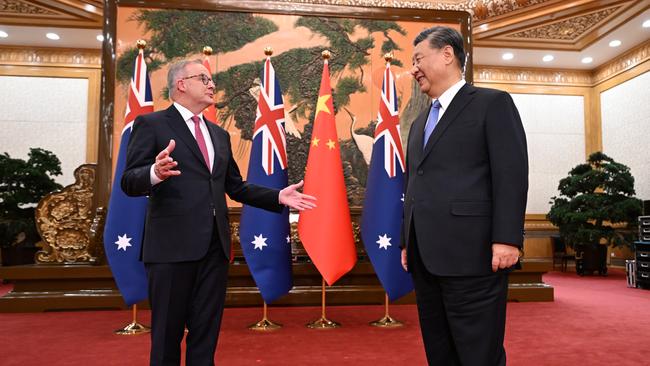HMAS Hobart near-miss shows China holds Australia and Labor in contempt despite dialogue


All the happy talk from the Prime Minister and his senior ministerial colleagues about a newly stabilised relationship with China is shown to be worth absolutely nothing.
The Chinese air force, which harassed a helicopter launched from HMAS Hobart in the Yellow Sea, was just as hostile, just as dangerous, just as irresponsible as any similar action the Chinese military took against Australian forces when Scott Morrison was prime minister.
The Chinese have trained the Albanese government now to regard the mere existence of high level meetings, the dialogue, the so-called normalisation, as the object of Australian policy.
But in foreign affairs, a dialogue is meant to achieve something. To be worthwhile, a dialogue has to have substance, purpose and effect. The Albanese government’s dialogue with the government in Beijing has so far achieved absolutely nothing.
It was always the case, and long predicted by this writer, that Beijing would eventually get tired of imposing its fairly minor trade sanctions on Australia.

When Beijing moved its global diplomatic approach away from its extremely counter-productive wolf warrior style back to its default charm offensive style, a few trade restrictions against Australia, which never had the slightest justification anyway, were removed.
In exchange, the Albanese government dropped its actions against China in the World Trade Organisation, stopped criticising China unless the Chinese military actually endangered Australian military personnel overseas, and stopped saying why we were pursing AUKUS nuclear submarines in the first place.
At the same time, the Albanese government effectively gave up any effort to modernise or expand Australia’s military capabilities, outside the absurdly distant time horizons of the notional AUKUS subs.
But all that good behaviour has earnt Canberra nothing.
Albanese says he will raise the latest dangerous and provocative Chinese action with the Premier of China, Li Qiang, when he visits Australia in June.
I wonder of Li will end up visiting, and I wonder if Albanese will actually raise the matter with him.

Last time the Chinese aimed sonars at Australian naval personnel, actually injuring them, the Australian government kept the incident quiet until after the APEC summit was finished so that Albanese didn’t have to raise the matter with China’s president, Xi Jinping, nor take questions on it at a press conference.
What on earth is the point of erecting this architecture of dialogue if the Australians are so timid and scared that they cannot even raise the most serious matters with the Chinese, in case they once more get banished diplomatically?
That’s not dialogue, that’s subservience.
Government figures occasionally claim that Foreign Minister Penny Wong has a good rapport with her Chinese counterpart, Wang Yi. Yet when Wang Yi visited Australia he went out of his way to humiliate Wong by seeking out her most vituperative and contemptuous critic, Paul Keating, and lavishly praising Keating’s views on China, which have included numerous personal attacks on Wong.
Frankly, I’d rather Wong had a frosty relationship with her Chinese counterpart and not have Australian service personnel endangered, than have a warm relationship but have an endless series of these incidents at sea.

The chief of the Australian Navy, Mark Hammond, only a week ago raised these reckless Chinese incidents with his Chinese counterpart. That conversation it turns out wasn’t worth the secret recordings the Chinese no doubt made of it.
The other critically important lesson out of this incident is just what a tiny, feeble navy we have. The Australian ship involved was the HMAS Hobart, one of our three Air Warfare Destroyers. These are the only modern warships we have.
All navies have a rule of three. You need three ships to deploy one. So participating in this United Nations Security Council authorised operation takes up in effect the entirety of the Australian naval surface combatant fleet.
We were going to upgrade the ANZAC frigates so they too could possibly participate usefully in international operations like this. But the Albanese government, though it is pumping money out at a furious rate, decided instead to start retiring the ANZACs.
Notionally we are building general purpose frigates, which will be very light frigates, to begin replacing them, and plan to get the first at the end of the decade. Yet the bid by the Korean defence firm, Hanwha, to buy Austal, which the government has designated as its strategic sovereign ship building partner, has complicated all this.
There hasn’t even been a formal request for tender issued for the new light frigates. Yet Defence Minister Richard Marles, who has developed a magnificent tradition of claiming credit and praising himself for things which have not happened and are not likely to happen, claims the light frigate will be delivered in record fast time. Gimme a break. The government is in its third year in office and hasn’t yet ordered a single new combat ship.
No matter how many signals the Chinese send us, and the signal in the Yellow Sea could hardly be more clear, we are determined to do nothing to be able to defend ourselves, or even contribute meaningfully to coalition defence, even in our own region.






Beijing has made it absolutely clear that it holds the Albanese government in contempt.